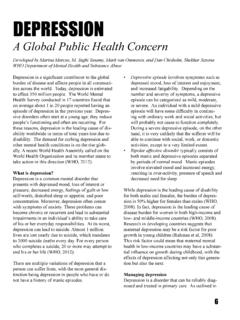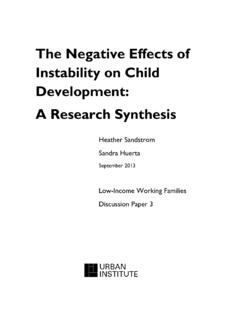Transcription of Factors Affecting the Academic Achievement: A Study of ...
1 Journal of Education and Practice ISSN 2222-1735 (Paper) ISSN 2222-288X (Online) , , 2016 70 Factors Affecting the Academic Achievement: A Study of Elementary School Students of NCR Delhi, India MeenuDev, Assistant Professor, College of Teacher Education (MANNU), NUH Mewat, Haryana Abstract Aim: The foremost aim of the Study was to investigate and analyze the relationship of General Mental Ability, Interest and home environmentwith Academic :The participants were 110 students drawn from three KendryaVidyalayas of Delhi. Their ages ranged between 13 and 14 with a mean age of years. Two validated instruments were used to elicit responses from the participants-General mental ability test prepared by R. K Tandon (1972),Multiphasic Interest Inventory of S.
2 K. Bawa (1998) and Home EnvironmentInventory of K S Mishra (1989) were administered on the selected sample. Whereas their annual examination grades of class VIIwere considered as Academic : Four major hypotheses were formulated and tested at level of significance. Pearson-Moment Correlation Co-efficient and t-test were used to analyze the data. The Study reveals that General Mental Ability, home environmentInterest and Academic achievement are significantly and positively correlated. Whereas the high score of girls indicates that they are superior to boys. Keywords:General Mental Ability, Gender, Home Environment, Interestand Academic Achievements. Introduction Academic achievement of students especially at the elementary school level is not only a pointer to the effectiveness or otherwise of schools but a major determinant of the future of youths in particular and the nation in general.
3 Learning outcomes have become a phenomenon of interest to all and this account for the reason why scholars have been working hard to untangle Factors that militate against good Academic performance (Aremu&Sokan, 2002). This phenomenon has been variedly referred in literature as Academic achievement, or scholastic functioning. Academic achievement of learners has attracted attention of scholars, parents, policy-makers and planners. Adeyemo (2001) opined that the major goal of the school is to work towards attainment of Academic excellence by students. According to him, the school may have other peripheral objectives but emphasis is always placed on the achievement of sound scholarship. Besides, virtually everybody concerned with education places premium on Academic achievement; excellent Academic achievement of children is often the expectation of parents (Osiki, 2001).
4 Gender is one of the personal variables that have been related to the differences found in motivational functioning and Academic achievement. Different researcheshave demonstrated the existence of different attribution patterns in boys and girls, such that while girls tend to give more emphasis to effort when explaining their performance (Lightbody, Siann, Stocks, & Walsh, 1996; Georgiou, 1999; Powers & Wagner, 1984), boys appeal more to reasoning ability as cause of their Academic achievement (Burgner&Hewstone, 1993). Many researches have also pointed out that girls usually make external attributions for successes and failures, and that when they make internal attributions, these refer not so much to effort, but to ability (Wiegers&Friere, 1977; Postigo, Perez &Sanz, 1999). However, boys usually attribute successes to stable internal causes like effort, thus showing an attributional pattern which enables them to enhance their own image of themselves (Smith, Sinclair & Chapman, 2002).
5 Researches on gender differences in cognitive processes, intellectual abilities, area of interest, stereotypical perceptions of every-day behaviours and the ability to perform various tasks has been a neglected area. Two theories explaining personality differences between men and women have been proposed. The first suggests that the male is the prototypical human, and females should be understood in relation to men. The second discourses that men represent the cognitive domain, which is positively valued in Euro-American culture, and women represent the less-valued affective realm (Klein, 2004). The differences in the scholastic achievements of boys and girls are generally attributed to biological causes and/or to cultural and stereotypes (Klein, 2004). The last two decades have been devoted to addressing gender inequality in education (Nayar U 1996).
6 Some studies have shown an all time low participation of women in education. Educators have therefore expended tremendous efforts in the Study of the personal Factors Affecting Academic achievement. A rich harvest of explanation of causes, understanding of cost to the society and possible intervention has brought about several researches, workshops, seminars and training in this area. The influence of home environment on students Academic achievement at the individual level is still prevalent, but less strong in much of the literature. There is an awareness of the importance of the home environment or family structure on student s Academic achievement. The home has a great influence on the Journal of Education and Practice ISSN 2222-1735 (Paper) ISSN 2222-288X (Online) , , 2016 71 students psychological, emotional, social and economic state.
7 In the view of Ajila&Olutola (2000), the state of the home affects the individual since the parents are the first socializing agents in an individual s life. This is because the family background and context of a child affect his reaction to life situations and his level of performance. Although, the school is responsible for the experiences that make up the individual s life during school periods, yet parents and the individual s experiences at home play tremendous roles in building the personality of the child and making the child what he is. Thus, Ichado (1998) concluded that the environment in which the student comes from can greatly influence his performance in school. The state of the home may affect individual since the parents are the first socializing agents in an individual s life. This is because the family background and context of a child affect his reaction to life situations and his level of Academic achievement.
8 Since no nation can rise above the level of education of her citizens. Interest is defined by Typhoon International Corp. (2004: 662) as the attention with a sense of concern; lively sympathy or curiosity; and the power to excite or hold such attention (in something). Interest plays an important role in the field of psychology as a number of researches have showed that it is related to personality, motivation, cognition, development, emotion, vocations, aesthetics, behavior, hobbies, reasoning, and information processing (Silvia, 2006). A few studies have found interest to be a factor that relatively influences reading and text processing. Though there is evidence that seductive details of interest has detrimental effect as it impairs comprehension; interest promotes comprehension and memory for several reasons: interest increases attention to a text; interest makes people process a text more deeply; and interest promotes good meta-cognitive strategies (Silvia, 2006).
9 Interest in learning, could most probably be a very powerful affective psychological trait and a very strong knowledge emotion as well as an overwhelming magnetic positive feeling, a sense of being captivated, enthralled, invigorated and energized to cognitively process information much faster and more accurately in addition to most effective application of psychomotor traits like self-regulatory skills, self-discipline, working harder and smarter with optimum persistence (Kpolovie, 2010a). He recommended the need of conducting more researches for ascertaining the actual role that interest in learning plays in students Academic attainment at all levels of the educational system. The nature and strength of one s interest in learning and in schooling may represent an important aspect of personality (Anastasi&Urbina 2007).
10 The characteristic, interest, may substantially influence educational and occupational achievement, interpersonal relations, the enjoyment one derives from leisure activities, and other major phases of daily living. Values are clearly related to life choices and are often discussed in conjunction with interests and preference. From the view point of the student and what he intends to achieve educationally, a consideration of his interest might be of practical significance. The interest must be there for him to devote time for his Study . Growing knowledge leads to growing interest as new information increases the likelihood of conflict ( , conflict of coming across a fact or idea that does not fit into what the individual has already learnt) (Silvia, 2006; Paul, 2014). The more a person knows or learns about a domain, the more interesting the domain becomes to him.
















